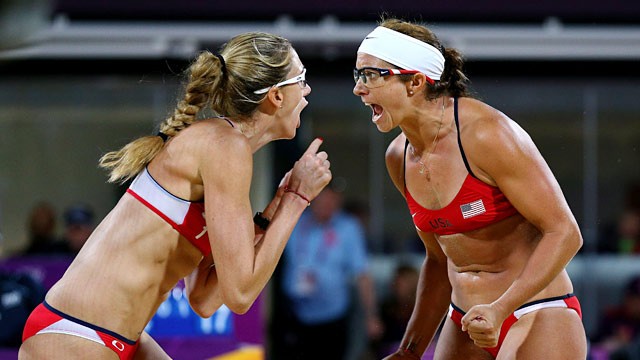How to be on top of your mental game
Did anyone else watch the beach volleyball match between the young Italian women and the seasoned US women? I listened as the announcer babbled on about how the Italian women could be the next Misty May and Kari Walsh. And then, I watched horrified as the 21-year-old Italian broke down in tears after the first match. I seriously had to lift my jaw off the ground because I couldn’t believe she was really crying between matches.
These are Olympic athletes! They have spent years and years preparing their bodies for just a few games. Their lives revolve around volleyball: they have volleyball coaches, they probably have a strength and conditioning coach, they see sport nutritionists, they have athletic trainers… but you know what they don’t have? They probably skipped over a key piece of their training – their mental training. Gold medalists Misty May-Treanor and Karri Walsh Jennings (below) were definitely mentally sound during the Olympics.
I think if we are honest with ourselves, we can all point out more then one occasion where we broke down during the heat of competition. Maybe not on the Olympic stage, but at some point I think we all have struggled mentally during our sport. Let me give you one of my personal examples, one of which I am definitely not proud of. Here’s the setting: it’s my freshmen year of college and I am this 2-sport athlete who is juggling 2 sports (obviously), but also boys, classes, teammate drama, and just the newness of living on my own. I am living in the dorms with the only other freshman on my basketball team, who also plays the same position as me.
For some reason, our basketball coach likes me a lot. She likes me so much that I get to spend about half of each practice running suicides solo, I get extra special attention in the form of yelling, and I even get to come in to do extra track workouts. Well, she chose to put me through a little 6am track workout on the morning of one of our biggest games of the year. That was no big deal; remember I have always been a crazy strength/conditioning guru. But here’s the kicker, I suit up for the game, go through warm-ups, and then sit on the bench and watch as my team struggles. You could say I was a defense-specialist, so it was killing me to watch as the other teams best player tears us apart. So what do I do? I break down like the Italians except I don’t have sunglasses to cover the tears. We lose the game, I get yelled at in front of my team for being a selfish player, and then I go play some pick-up ball with the boys to blow off some steam. In my collegiate career, that was the only game I didn’t play in and that was by far my worst mental break down. Boy do I wish I had someone working with to help me win that mental battle.
I could give you lots of examples where I broke down mentally. I would say I owe a lot of my mental toughness to my high school and college basketball coaches. But I sure wish I had someone helping me deal with these stressful situations and helping me to win the mental battle each and every practice and game. Even now, I joke around about playing beach volleyball in the 2016 Olympics and I tell my mental coach friends that I would hire them to help me deal with pressure and also just trusting your teammate. To be honest, I haven’t always been this open to mental coaches. The switch just happened recently when I was talking to my friend Zoe Littlewood who does mental training with some of the softball girls I work with. She was talking about one softball player in particular who has recently switched from batting right, to batting left-handed. This player has been working with Zoe for a few months and she is now batting over .500. And then Zoe finished with saying this, “Her sessions are almost up, and at the end I don’t think I could ask her parents to renew. She has done everything I suggested for her to do.” When I asked what kinds of things she worked on, she said they formed a pre-game ritual so she was mentally prepared for every game. They also had a series of things for the softball girl to think about before going up to bat. And the reason for this? So that the negative self-talk can’t enter in before her at-bat. Boy, do I ever wish I had someone like Zoe during my years of softball. Such a simple concept, but one that can make a HUGE difference in your performance.
I sat down with my good friend Dawn Fletcher to ask her a few simple tips that could help athletes get started. These tips are just to build a base, just like in my last post on developing strength for softball/volleyball/tennis.
5 things you can do right now to improve your mental game:
1.) Start a training journal
After practice, competition or training session - write down a few feelings and thoughts about how things went. Write down 1 thing you want to improve upon and 2 things that you are proud of yourself for - along with any other noteworthy thoughts.
2.) Write down 5 athletic traits or attributes that you want to be described as
Try to make these things non-physical (ie. courageous, brave, a leader, determined, driven, steady). Now write down 5 things you DON'T want to be described as (ie. lazy, bossy, someone who gives up, a head case).
3.) Tell your coach or a teammate what your athletic goals are
Verbalizing your goals to someone will keep you accountable.
4.) Take 5 minutes before practice/game/training to think
Think about why you are there and what you want out of yourself. Build this as part of your routine – find a spot where you can hang out and remind yourself of your goals, your purpose here and what you want to accomplish during that session or game. Also remind yourself that it is important to have a good time and enjoy the process.
5. Concentrate on what you can control
Write down 3 things in your environment that you can control and 3 things that you can't. For example: you can't control what drills you do in a training session, the weather for a game, your opponent pulling your jersey etc. You can control how you react, how you prepare for the game, your emotions and the words that come out of your mouth.
There you have it. Five things you can start doing right now to start working on your mental game. Remember, mental skills can be taught, practiced, and perfected, just like physical skills like strength, running, throwing, passing and so on. And as you progress through junior high, to high school, to college, one of the biggest dividing factor between being good and great is your mental attitude.

